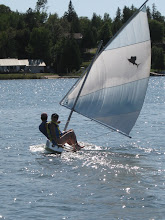If we suspend our disbelief for just a moment, and forget the physical impossibilities of walking on a cloud, it still does not appear to be a very pleasant experience. I'm fairly certain that I have no interest in walking on a cloud, as I imagine the experience would be rife with windy dangers, not to mention cold and clammy.
I bring this up merely because yesterday was a day that we lived in a cloud. The miraculous four inches of snow that appeared during the super bowl disappeared in a cool haze of drizzle. The air was so thick that you felt the particles enter your nose and begrudgingly make their way down to your lungs, where they settled.
Mia said that it was the sort of day that you see in the movies. Everything was dramatic and mysterious due to the weather. It was, it certainly was not the tormented sky that Duff loves, but it was not without its own allure. The sky was very hidden or very close, depending just how you're interested in defining "sky".
Weather is one of those things that we not only can not control, but we still can only somewhat predict. It is frustratingly more like an art than a science. I think I like it that way; defying our attempts to control it. We have made these attempts as counter-intuitive as it may seem. Ski resorts have machines that expel dust into clouds to promote the formation of snow flakes, but ultimately nature can not be contro0led or contained in this way.
None of nature can be contained for long. I read a very interesting book over the summer:
The World Without Us by Alan Weisman. It described step by step and piece by piece what would happen to the earth if humans simply and suddenly disappeared. Nature has this incredible and persistent way of erasing the things that we do to it.
This of course should be in no way taken as a promotion of us doing whatever the heck we want to the earth. The earth will fix itself, but only in the presence of much time and the absence of humans.
Two interesting facts that I will share with you from this book, though there are many and it's an easy read so I recommend it.
One: one of the most harmful things that we are putting in the environment right now are tiny plastic pellets that are the base of plastics. They are what are melted down and formed into things, but first they are tiny pellets. They are too small to be filtered out of water but too big to get out of fishies systems. They are mixed in with the sand on beaches as well as in animals bellies.
Two: There is a giant gyre in the Pacific ocean where all of the currents converge (the North Pacific Gyre to be precise). There you can find miles and miles of ocean that our trash floats to and stays. Miles and miles of trash all on the surface and presumably under the surface of the Pacific ocean. What a sight that must be to see.
